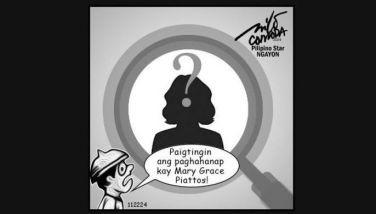Right to reimbursement

This case of the spouses Mando and Mila is quite rare as it involves the payment of their indebtedness by another entity.
The case revolves around two parcels of land owned by a realty company (RMS) whose president, Romy, is the best friend of the couple. Needing some funds, they asked Romy if they can borrow the two parcels for use as collateral of a loan they would obtain from a bank. Romy agreed.
So Mando and Mila got the owners’ duplicate copy of the titles to the two parcels of land from Romy and used them as collateral for a credit line they were applying from a bank (Bank). Accompanying said titles was a board resolution contained in a Secretary’s Certificate of the realty company’s corporate secretary.
People from RMS, however, discovered that the signature of the corporate secretary was actually forged. But before the company took any steps to protect its interests on the titles, a loan of P610,000 was already released by the Bank to Mando and Mila after they signed a real estate mortgage (REM) and promissory notes with the use of said false secretary’s certificate.
In fact, it was only about six years later, when the spouses failed to pay their obligation and when the Bank initiated foreclosure proceedings, that RMS tried to annul the REM by filing a case in the Regional Trial Court (RTC) alleging forgery of the signature of its corporate secretary. RMS claimed that it discovered the forgery only a few months before.
So the foreclosure was initially enjoined by the RTC. Eventually, however, after hearing the parties, the RTC issued a ruling which allowed the Bank to proceed with the foreclosure after determining that RMS discovered the forgery six years ago. It ruled that RMS has actually ratified the mortgage contract between the spouses and the Bank. RMS questioned this ruling up to the Supreme Court but it was sustained. So, to avoid foreclosure of its properties, RMS was forced to settle Mando and Mila’s loan from the Bank, then already totaling P3,367,474.42 including interests, penalties and service charges.
Two years later, RMS demanded reimbursement from the spouses the amount it paid to the Bank. When the spouses did not heed its demand, RMS filed a complaint against the spouses before another branch of the RTC to claim reimbursement of said amount. But the RTC dismissed its complaint upon motion of the spouses. The RTC found that the complaint is based on fraud or the forgery of the secretary’s certificate which RMS discovered 15 years ago. Thus the RTC said that the RMS complaint was filed beyond the prescriptive period of only four years from discovery of the fraud. Was the RTC correct?
No. RMS paid the Bank to avoid foreclosure of the mortgage which it tried to annul but failed because it has actually ratified said mortgage. So, in effect, RMS became a third-party accommodation mortgagor which paid the debt of Mando and Mila to the Bank as an interested third party.
Under Article 1236 second paragraph of the Civil Code, “whoever pays for another may demand from the debtor what he has paid except that if he paid without the knowledge or against the will of the debtor. He can recover only insofar as the payment has been beneficial to the debtor.”
Even if the spouses insist that RMS’s payment was without their knowledge or against their will, RMS still has a right to reimbursement because it is a person interested in the fulfillment of the obligation under Article 1302 (3) of the Civil Code. RMS has an interest in the fulfillment of the obligation because it owns the properties mortgaged to secure the obligation of the spouses. It is subrogated to the right of the creditor. It actually steps into the shoes of the Bank and becomes entitled not only to recover what it has paid but also to exercise all the rights which the Bank could have exercised. There is, in such cases, no real extinguishment of the obligation, but a change in the active subject.
RMS’s action against the spouses Mando and Mila is on the basis of a mortgage contract ratified by the court and thus created by law. Hence it prescribes in ten years (Article 1144 CC). The period of prescription starts from the date of payment by RMS of the spouses’ debt to the Bank. This present complaint was filed two years later when the spouses failed to heed RMS’s extrajudicial demands. It is clear therefore that RMS’s cause of action has not yet prescribed. So the spouses should reimburse RMS the amount of P3,367,474.42 with 16 percent interest from April 9, 1996 plus attorney’s fees of five percent of the total award (Cecilleville Realty etc. vs. Spouse Acuna, G.R. 162074, June 13, 2009).
- Latest
- Trending



























